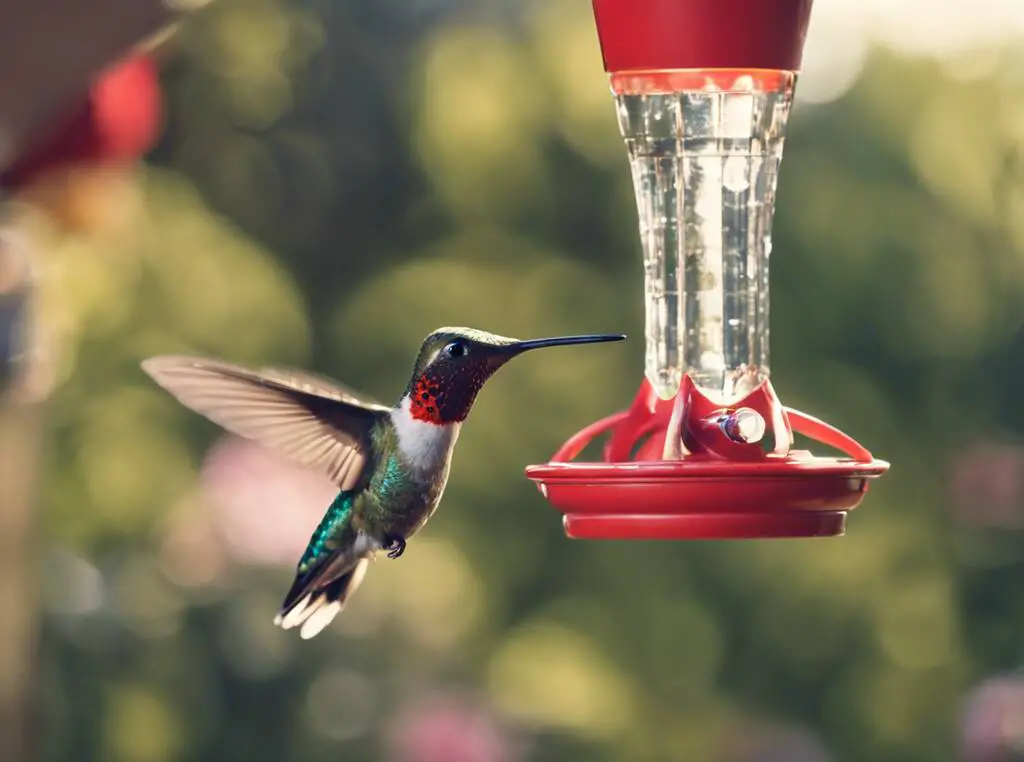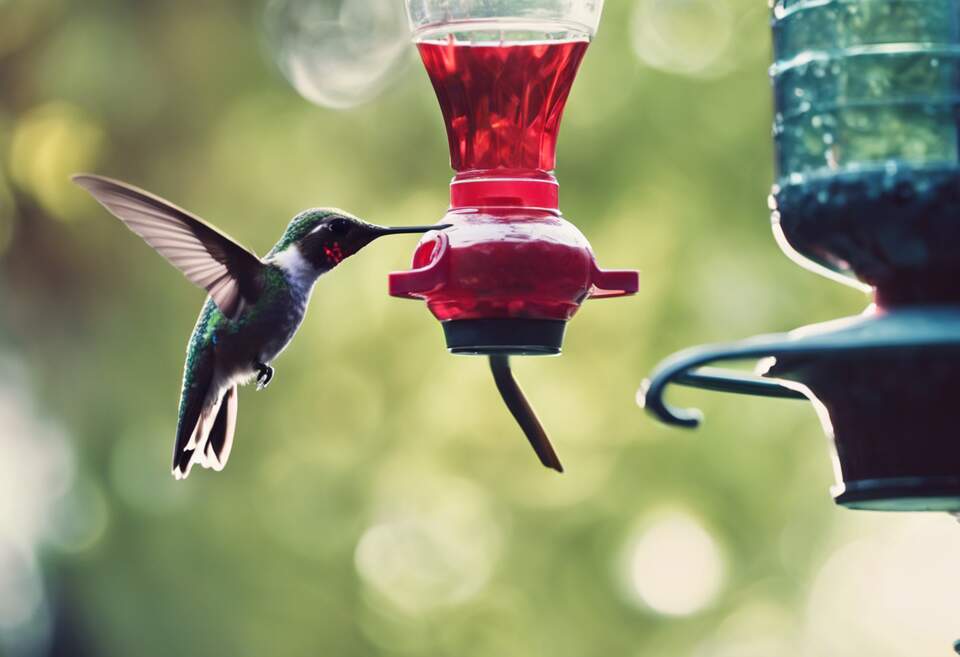Hummingbirds are fascinating creatures that bring joy and energy to any garden. To attract these beautiful birds to your yard, one of the best ways is by offering them a tasty treat – hummingbird food. Making hummingbird food at home is a simple and cost-effective way to ensure these delightful creatures keep coming back for more. Here is a step-by-step guide on how to make hummingbird food.
Table of Contents
Step-by-Step Guide on How to Make Hummingbird Food
Gather the Ingredients
Before you start making hummingbird food, it’s essential to gather the necessary ingredients. You will need granulated white sugar and water. It is crucial to use only white sugar, as other sweeteners like honey, brown sugar, or artificial sweeteners can be harmful to hummingbirds.
Mix the Sugar Solution
To make the hummingbird food, mix four parts water with one part sugar in a saucepan. For example, you can use one cup of sugar to make four cups of hummingbird nectar. Bring the water to a boil and stir until the sugar is completely dissolved. Ensure the water is hot but not boiling for an extended period as this may alter the sugar-to-water ratio.
Cool the Nectar
Once the sugar is completely dissolved, remove the saucepan from heat and let the nectar cool to room temperature. It’s crucial to allow the hummingbird food to cool before filling the feeders as hot liquid can warp or damage plastic feeders.
Fill the Feeder
Once the hummingbird nectar has cooled down, carefully fill your hummingbird feeder with the homemade nectar. Ensure there are no leaks in the feeder, and it is clean to prevent any contamination that could harm the hummingbirds.
Hang the Feeder
Find a suitable location in your garden to hang the hummingbird feeder. Choose a spot that is easily visible from a distance but also provides the birds with some protection, such as near bushes or trees. Make sure the feeder is out of reach of any predators that may harm the hummingbirds.
Maintain the Feeder
It’s essential to clean the hummingbird feeder regularly to prevent mold growth and ensure the health of the hummingbirds. Wash the feeder with hot water and mild soap every time you refill it with fresh nectar. Additionally, change the hummingbird food every 3-5 days, especially in hot weather, to prevent fermentation.
By following these simple steps, you can easily make hummingbird food at home and attract these delightful birds to your garden. Providing them with a reliable food source not only benefits the hummingbirds but also allows you to enjoy their beauty and charm up close. So, grab your ingredients, mix up a batch of nectar, and get ready to welcome these incredible creatures into your outdoor space.
Importance of Providing Proper Nutrition to Hummingbirds
Proper nutrition is essential for the well-being of all living creatures, including hummingbirds, which are fascinating and delightful birds known for their agility and beauty. As tiny birds with incredibly high metabolic rates, hummingbirds require a diet rich in nutrients to support their active lifestyle. Providing the right nutrition is crucial in ensuring their survival, especially during migration seasons and harsh weather conditions.
Understanding Hummingbird Nutrition Needs
Hummingbirds primarily feed on flower nectar, tree sap, sugar water from feeders, and small insects. Their diet is high in natural sugars, which provide the necessary energy for their constant hovering and rapid wing beats. In addition to sugars, hummingbirds also require proteins, vitamins, minerals, and amino acids for optimal health. A well-rounded diet is vital in supporting their immune system, promoting healthy feather growth, and sustaining their high energy levels.
Benefits of Providing Proper Nutrition
- Energy Boost: Proper nutrition ensures that hummingbirds have the energy they need to fly long distances, forage for food, and evade predators. Sugar-rich nectar provides a quick source of energy, while insects offer essential proteins for muscle strength and endurance.
- Enhanced Health: A balanced diet leads to improved overall health and well-being in hummingbirds. Essential nutrients support their metabolism, aid in digestion, and help combat diseases, keeping these tiny birds healthy and vibrant.
- Breeding Success: During the breeding season, female hummingbirds have increased nutritional requirements to support egg development and care for their young. Providing adequate nutrition can enhance breeding success rates and contribute to the survival of hummingbird chicks.
How to Make Hummingbird Food (Recipe)
Making your own hummingbird food is a cost-effective and rewarding way to ensure that these beautiful birds have access to a nutritious diet. Follow these simple steps to create a homemade hummingbird nectar solution:
Ingredients:
- 1 part white granulated sugar
- 4 parts water
Instructions:
- Boil the water to remove any impurities and let it cool to room temperature.
- Mix the sugar into the water until completely dissolved to create a clear nectar solution.
- Fill your hummingbird feeder with the nectar and place it in a shady spot away from predators.
- Clean and refill the feeder every 2-3 days, especially in hot weather, to prevent fermentation and mold growth.
Providing proper nutrition to hummingbirds is a simple yet impactful way to support their health and vitality. By understanding their dietary needs and offering a nutritious diet, you can attract these enchanting birds to your garden, observe their fascinating behaviors, and contribute to their well-being. Whether through homemade nectar or suitable plants in your yard, promoting hummingbird nutrition is a fulfilling endeavor that benefits both the birds and the environment.
Conclusion
As we wrap up our discussion on how to make hummingbird food and the importance of providing proper nutrition to these exquisite birds, it becomes evident that by following a simple step-by-step guide, we can contribute significantly to the well-being of hummingbirds.
By preparing a sugar water solution with the right proportions and avoiding the use of harmful additives such as food coloring, we can attract hummingbirds to our gardens and provide them with the essential energy they need for their daily activities. The process is straightforward and cost-effective, making it accessible to anyone interested in supporting these fascinating creatures.
Understanding the significance of offering proper nutrition to hummingbirds goes beyond just feeding them. It ensures that they have access to a nutritious diet that replicates the nectar they naturally consume from flowers. This is crucial for their survival, especially during migration periods and breeding seasons when their energy demands are at their peak.
By creating a welcoming environment with well-maintained feeders filled with fresh hummingbird food, we not only help these birds thrive but also create an opportunity for us to observe their graceful presence up close. The delight of watching these tiny marvels hover and feed brings a sense of joy and connection to nature that is truly rewarding.
As we consider the impact of our actions on the well-being of hummingbirds, it becomes clear that every effort we make to provide them with a reliable food source contributes to their overall health and population sustainability. Through our commitment to offering them a safe haven with proper nutrition, we participate in a cycle of care and respect for the delicate balance of nature.
The process of making hummingbird food is a simple yet meaningful way to support these remarkable birds. By following the guidelines outlined in this article and recognizing the importance of their nutritional needs, we can create a haven that not only attracts hummingbirds but also nurtures their well-being. Let us continue to appreciate and safeguard these tiny visitors in our midst, honoring their presence with the care and understanding they deserve.



